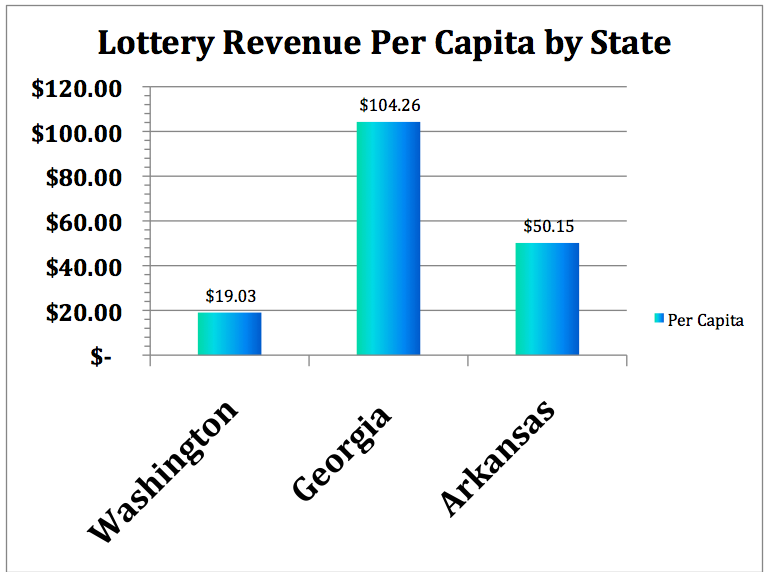Gambling, Baseball, Apple Pie, and College
State Senator Jim Kastama, Democrat from the 25th legislative district and the fine city of Puyallup, has introduced SB 6409, a bill that would shift the Washington State Lottery proceeds currently devoted to the K-12 construction fund to a new “Washington Investment in Excellence” fund, which would fund scholarships, research, and innovation in higher education.
Compared to states like Georgia and Arkansas, where the lottery seems to be doing a booming business, Washington’s lottery seems to be underperforming:
Senator Kastama feels that this gambling gap is the result of a wrong-headed marketing campaign. Here in Washington, we plug the lottery as a get-rich-quick-scheme:
While in Georgia, they sell the lottery as a way to support education:

Senator Kastama’s argument is that the state is leaving a lot of lottery dollars on the table by refusing to push the lottery as an education fund. This has been a conscious choice. State and local school organizations have been reluctant to connect the lottery to K-12 education, for fear that this would lead voters to think that gambling had sufficiently funded K-12 and make them less inclined to vote for school levies and bonds. Since there are no levies and bonds for colleges, that conflict wouldn’t exist if the lottery proceeds were devoted to higher ed.
Senator Kastama estimates that shifting the lottery advertising focus away from early retirement and toward sending a kid to college will attract a whole new clientele and expand lottery proceeds by as much as $456 million.
From our unabashedly university-centric point of view here at the blog, there’s a lot to get excited about in this idea, so let’s pause for a moment to take a larger view. Right now, lottery revenues (after the prizes have been paid and the overhead covered) go to three things: paying the vig on Safeco Field, the K-12 education construction account, and a program to help gambling addicts.
Since Mariners’ boss Howard Lincoln is currently a trustee at WWU and it looks like the Mariners are poised for a playoff run this season, we’ll pass for now on the rant about the public subsidizing billionaires and their professional sports hobbies. Suffice it to say that it is what it is.
The idea of shifting the money away from K-12 to higher makes sense in terms of the marketing argument, but we shouldn’t forget that it moves money from already desperately underfunded schools (unconstitutionally underfunded, as the judge told us last week) to desperately underfunded colleges and universities. As much as we’re homers for higher ed here at the blog, we don’t want our universities to be funded at the expense of Washington’s children.
The blood money for gambling addicts raises the whole question of why have a lottery at all. It’s like funding Alcoholics Anonymous with a tax on booze. It also highlights the fact that the lottery is yet another incredibly regressive tax in a state with the most regressive tax system in the country. Looking at this situation, any competent ten year old would pretty quickly arrive at the question, If we want to fund education, why not do it with a progressive income tax instead of preying on the desperate hopes of those living in the neglected regions of capital?
But, all that said, let’s reluctantly turn away from the world we hope for and back toward the one we find ourselves living in. Senator Kastama’s point is that if we’re going to have a lottery, why not encourage more people who can actually afford it to play it by selling it as a tax for higher ed? That’s not a bad idea.
And, more importantly, Senator Kastama is the only person in Olympia right now arguing for a dedicated fund for higher ed. And we like that a lot. As a member of the Senate Higher Education and Workforce Development committee, Senator Kastama has shown that he understands the folly of using higher ed as the state’s rainy day fund, and he recognizes how bad it is for Washington that our four-year universities are among the worst funded in the nation. At a time when both Democrats and Republicans seem indifferent to destroying state universities with further cuts to already decimated budgets, it’s refreshing to have someone at least looking for a different way.
